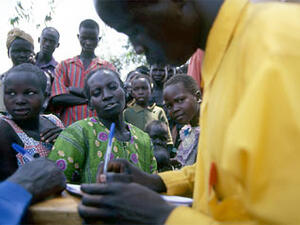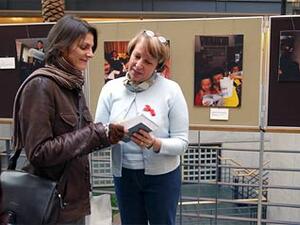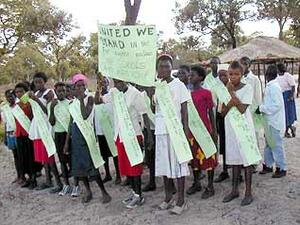Lubbers secures pledge Iraqis will remain in Jordan
Lubbers secures pledge Iraqis will remain in Jordan
High Commissioner Ruud Lubbers (centre right) meets officials from various U.N. agencies in the northern Iraq city of Sulaymaniyah on Friday.
AMMAN, Jordan, July 17 (UNHCR) - High Commissioner Ruud Lubbers today welcomed a Jordanian government decision to allow Iraqis to remain in Jordan while conditions in Iraq remain unsettled.
Lubbers also said that he urged the Jordanians to allow into Jordan on humanitarian grounds vulnerable people among Iraqis seeking entry. He said officials promised to look into special cases among the 1,200 people stuck in no-man's land between the Jordan-Iraq border.
"I am pleased that the Jordanian government has given no indication that pressure is being placed on Iraqis in Jordan to return to Iraq," Lubbers said after meetings with King Abdallah II, Foreign Minister Marwan Muasher and other senior officials. "This is a welcome move," he said.
Around 200,000 to 300,000 Iraqis are in a "refugee-like" situation in Jordan, according to the refugee agency.
Following a 36-hour stop in Amman, first leg of a four-nation tour of the region to assess when Iraqi refugees may return to their country, the High Commissioner flew into Erbil, administrative capital of the largely Kurdish Northern Iraq region.
In a meeting with "deputy prime minister" Sami Abdul Rahman of the local government of Erbil, Lubbers said the refugee agency will continue to work with partner agencies in solving the problem of internal displacement in Iraq.
Lubbers was briefed in an inter-agency meeting earlier in Erbil on international efforts to assist hundreds of thousands of Iraqis who had been uprooted in Iraq because of conflicts and the previous government's "Arabization" campaigns. Many of them live in squalid tent camps, warehouses and ther buildings.
Last month, UNHCR began a programme to help stabilize communities whose residents were forced from their homes in the mid-1980s. The refugee agency distributed tents and relief items to 530 people in two villages in Erbil after local officials and U.S. authorities mediated a settlement between original Iraqi Kurd villagers and Arab settlers for an equal sharing of this year's harvest of wheat and barley. Other agencies are constructing basic facilities in the villages under the programme coordinated with local authorities.
Lubbers is expected on Saturday in Baghdad, where he will meet the Special Representative of the Secretary-General, Sergio Vieira de Mello, and other officials.
He flies early next week to Basra, southern Iraq's principal city, before travelling to Iran. There, he will visit Ashrafi refugee camp, from where small groups of Iraqi refugees have spontaneously returned to Iraq. Iran hosts 200,000 Iraqi refugees. He will then proceed to Kuwait before flying back to Geneva.
Last Monday in Geneva, High Commissioner Lubbers said the agency would like to see Iraqi refugees desperate to return home from camps in Iran go back in a coordinated manner, rather than rush back to a volatile and unstable situation.






